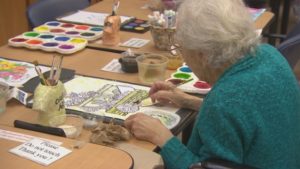The following editorial was published by CBC News on Nov. 26. It was written by Suellen Beatty, CEO at Sherbrooke Community Centre in Saskatoon.
+++
Changing the approach to dementia

I believe that people with dementia suffer from discrimination every day because of the way we have been taught to view them.
I am saddened in an age of increased tolerance and inclusiveness that this generosity of spirit is not extended to people with dementia. Let’s stop judging and labelling and instead create moments of joy.
Join me in creating a dementia-friendly community.
“We must change our minds about people whose minds have changed,” said Dr. G. Allan Power, a renowned geriatrician who specializes in dementia care.
I have a special spot in my heart for those who struggle to make sense of the world around them and to communicate their basic needs.
I have worked with people with dementia for over 30 years and have experienced the disease in an intimate way with my mother, who spent her last years at Sherbrooke Community Centre in Saskatoon.
As a family, we were fortunate to reach her by creating conditions where she could be successful. She coped best when she was happy so we worked to create moments of joy.
For her, music was powerful. We didn’t dismiss her attempts to communicate her needs in ways that didn’t make sense to us, but rather worked to understand, support and sometimes find the humour in an awkward situation.
Expectations need to change after diagnosis
 We need to recognize that people with dementia have a disability and we need to put effort into helping them navigate this now confusing and challenging world. We cannot expect them to ‘behave’ as they did prior to their diagnosis.
We need to recognize that people with dementia have a disability and we need to put effort into helping them navigate this now confusing and challenging world. We cannot expect them to ‘behave’ as they did prior to their diagnosis.
Expecting someone with dementia to ‘behave’ in a ‘socially acceptable way’ like they did pre-dementia is as ridiculous as expecting someone who is quadriplegic to get up and walk. We must change our expectations of the person and accommodate for their disability.
In our society, we have built ramps for people who have physical disabilities. Power asks us “where are the ramps for people with dementia?”
I believe they are lacking. Instead of being supported, viewed with compassion and empathy, people with dementia are treated as outcasts.
The research on happiness is clear: When we are full of joy we function at a higher level than we do when we are stressed. This is particularly true for those with dementia. However, the current view of people with dementia is defeatist and doesn’t require us to do all we can to create well-being and joy for them.
When we can’t understand the person with dementia and their everyday attempts to communicate a need to go for a walk, search for a misplaced item or let someone know they are cold or hungry; when they can’t find the words, we label these communications as symptoms of the disease.
‘Medicalizing’ attempts to communicate
 We have ‘medicalized’ their attempts to communicate their unmet needs and called them behavioural psychological symptoms of dementia. This then prompts us to look for a medical solution, generally a drug, which usually makes matters worse.
We have ‘medicalized’ their attempts to communicate their unmet needs and called them behavioural psychological symptoms of dementia. This then prompts us to look for a medical solution, generally a drug, which usually makes matters worse.
I am heartbroken by the current paradigm that encourages us to treat people who are confused with drugs that make them feel unwell, increase their risk of dying, cause constipation, increase their risk of falling and create more confusion.
How can this possibly help the person with dementia?
I can imagine myself in their situation and I realize how terrifying it must be. Our current view and treatment of people with dementia should cause all of us to be afraid. We need to change our view to see people with dementia as having a disability, and our approach should be to help them succeed by focusing on their strengths and work to create joy.
With my mother, we learned to alter our approach, understanding that it was unreasonable and foolish to expect her to act as she had before she became disabled with dementia. We learned that happiness and love were our secret weapons against the disease.
Any attempts to correct mom or try to reason with her usually resulted in her being frustrated and ultimately, functioning poorly. We learned that showering her with love, compliments and being grateful for her presence was powerful and necessary for her success.
Click here to read the entire article from CBC News.




